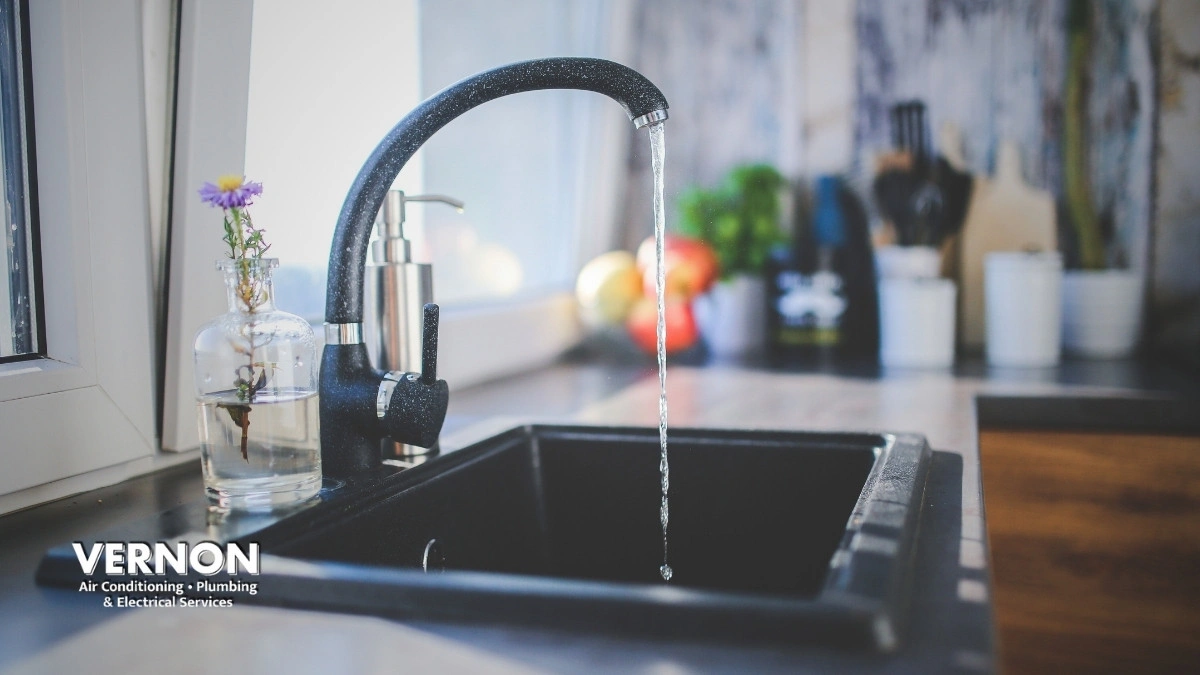Table of Contents
If you’ve ever been told you need maintenance on your hot water tank regularly, you’re not alone. It sounds like a no-brainer, right? Preventative maintenance equals peace of mind, except that with hot water tanks, that’s not always the case.
At Vernon Air Conditioning, Plumbing & Electrical Services, we typically don’t recommend hot water tank maintenance for most homeowners. Why? For modern residential tanks, regular maintenance services aren’t just unnecessary; they can actually lead to new problems.
However, if you do choose to service your hot water tank, there are a few important considerations to keep in mind. We want you to make an informed decision and be aware of the potential risks associated with it.
Here’s what you need to know.
Should I Service My Hot Water Tank?
Most homeowners don’t need to service their hot water tank. Modern tanks are generally low-maintenance; however, routine servicing can still lead to leaks or other issues. Only service it if you notice problems, such as noise, rust, or temperature changes.
What Does Hot Water Tank Servicing Involve?
If you hire someone for hot water tank servicing, they’ll likely perform a few common tasks:
- Flushing the Tank: This removes sediment and mineral buildup, which can affect efficiency. However, if sediment is already heavily caked, disturbing it can lead to clogged lines or damage to your hot water system.
- Inspecting the Anode Rod: The anode rod is a sacrificial piece of metal designed to protect the tank from corrosion. If it’s degraded, your tank is vulnerable to rust. But pulling it out for inspection may not always go smoothly, especially in older electric water heaters.
- Checking the T&P Valve: This temperature and pressure relief valve is there for safety. It’s designed to release excess pressure if the tank overheats. However, during servicing, it’s often manipulated, which can lead to leaks.

Why We Don’t Recommend Routine Hot Water Tank Servicing
Let’s break it down with real-world experience from the plumbing field.
1. Risk of T&P Valve Leaks
The temperature and pressure relief valve is delicate. Servicing often involves manually releasing pressure to check if it’s working. That’s fine in theory, but in practice, this can cause the valve to start leaking. Once that happens, it needs to be replaced.
We’ve had multiple calls from homeowners whose T&P valves started leaking right after a service. It’s one of the most common issues we see after routine maintenance.
2. Flushing Can Stir Up Bigger Problems
Flushing a tank with moderate to heavy sediment buildup can exacerbate the issue. Instead of clearing it, you risk blocking the drain valve or sending sediment into your water supply lines.
If sediment is minimal, flushing might help but if it’s built up over time, it can clog pipes or damage components. We’ve seen it backfire more often than not.
3. Unnecessary Wear and Tear
Opening up a tank, removing components, and reassembling them can cause strain on older parts. The heating element, thermostat, and seals are often disturbed during service, and that can trigger problems that didn’t exist before.
It’s like taking apart an old appliance. Sometimes things that worked fine before don’t go back together quite the same.
4. Not Needed for Most Tanks
Modern residential water heaters are designed to operate efficiently with minimal maintenance. If your tank is producing consistent hot water, making no strange noises, and showing no signs of leaks, you’re likely good to go.
Servicing for the sake of servicing just isn’t necessary. Unless there’s a clear issue, you’re better off leaving it alone.
When You Should Call a Plumber
There are times when professional help is absolutely warranted. If you notice:
- Inconsistent water temperature
- Strange banging or hissing noises
- Water pooling near the base of the tank
- Rusty water or visible corrosion
Then it’s time to give us a call. In these cases, inspection and hot water tank repair are about fixing a known issue, not poking around and possibly creating one.
About Extra Charges
If you choose to have your tank serviced and we discover a faulty T&P valve, worn-out anode rod, or other issue, those repairs are not included in the service. We’ll always provide you with a quote first, but please note that hot water tank servicing often requires additional work.
We’d rather help you fix an actual problem than charge you for servicing something that was working just fine.
Don’t Fix What Isn’t Broken
Hot water tanks are built to be low-maintenance. Unless there’s an issue, there’s usually no benefit and real risk in opening them up for routine water heater maintenance. That’s why we don’t recommend it.
If something feels off, we’re happy to inspect and advise. However, if everything is working smoothly, it’s best to let it be.
The Other Side: Why Some Still Recommend Annual Maintenance
While our team doesn’t typically recommend routine annual maintenance for standard hot water tanks, especially given the cost-benefit tradeoff for most homeowners, it’s important to acknowledge that many manufacturers and industry professionals do recommend it.
Most major tank manufacturers, such as Bradford White, Rheem, and AO Smith, recommend flushing the tank annually, inspecting the anode rod, and checking the temperature and pressure relief valve. The reason is straightforward: sediment buildup, particularly in areas with hard water, can reduce efficiency, shorten the life of the tank, and potentially void warranties if not addressed.
Common Maintenance Recommendations:
- Flushing the tank to remove mineral deposits and sediment.
- Inspecting or replacing the anode rod helps prevent rust inside the tank.
- Checking for leaks, corrosion, or valve failure to catch early warning signs.
- On gas models, inspect the burner assembly and ensure proper combustion and venting.
Some homeowners, particularly those with high-efficiency or commercial-grade tanks, may still benefit from this kind of preventative care, especially if extending equipment life or preserving warranty coverage is a priority.
“They were fantastic. They got us booked in super fast, and were very helpful. Brandon the plumber was very helpful and polite when he was here. Will only be going with this company from now on.”
– R. Vinson
Our Take

We believe in providing honest, practical advice grounded in real-world results. In our experience, most residential tanks function reliably for years with minimal attention. The cost of yearly maintenance often adds up to more than it’s worth, especially when compared to the cost of replacing a tank every 8–12 years.
That said, if you’re the type of homeowner who likes to stay ahead of potential issues, or if you live in an area with high sediment levels, annual maintenance may still be a worthwhile consideration. And we’re happy to help you with it, even if it’s not our default recommendation.
Need Help Deciding What To Do Next?

Whether you’re thinking about hot water tank replacement, upgrading to tankless water heaters, switching to gas water heaters, or installing a new hot water tank, we’re here to walk you through it. Vernon Air Conditioning, Plumbing & Electrical Services provides honest, expert guidance with no pressure and no gimmicks.
Vernon Air Conditioning, Plumbing & Electrical Services
909 Kalamalka Lake Rd, Vernon, BC V1T 6V4
Phone: 778-403-7886
Need help with Hot Water? Book online or call today for great service across the North Okanagan.




